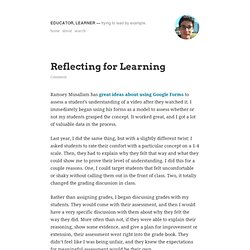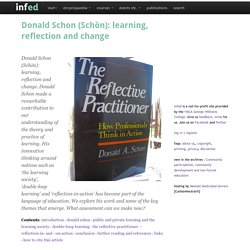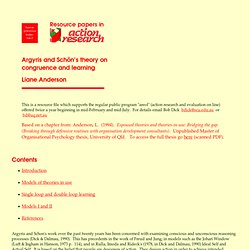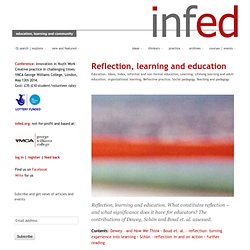

Reflecting for Learning. Ramsey Musallam has great ideas about using Google Forms to assess a student’s understanding of a video after they watched it.

I immediately began using his forms as a model to assess whether or not my students grasped the concept. It worked great, and I got a lot of valuable data in the process. Last year, I did the same thing, but with a slightly different twist: I asked students to rate their comfort with a particular concept on a 1-4 scale. Then, they had to explain why they felt that way and what they could show me to prove their level of understanding.
I did this for a couple reasons. Rather than assigning grades, I began discussing grades with my students. First, I created a simple Google form. Second, keep your ranking system on an even (2,4,6 etc) scale. Third, the form doesn’t do everything. Fourth, encourage them to set improvement plans and then reassess for a higher grade when they feel ready. This year, I’m going to try and include the blogging process more. Donald Schon (Schön) - learning, reflection and change. Contents: introduction · donald schon · public and private learning and the learning society · double-loop learning · the reflective practitioner – reflection-in- and –on-action · conclusion · further reading and references · links · how to cite this article Note: I have used Donald Schon rather than Donald Schön (which is the correct spelling) as English language web search engines (and those using them!)

Often have difficulties with umlauts). Donald Alan Schon (1930-1997) trained as a philosopher, but it was his concern with the development of reflective practice and learning systems within organizations and communities for which he is remembered. Significantly, he was also an accomplished pianist and clarinettist – playing in both jazz and chamber groups. This interest in improvisation and structure was mirrored in his academic writing, most notably in his exploration of professional’s ability to ‘think on their feet’.
Donald Schon Double-loop learning and theories in use Conclusion. Argyris and Schon's theory on congruence and learning. Argyris and Schön’s theory on congruence and learning Liane Anderson This is a resource file which supports the regular public program "areol" (action research and evaluation on line) offered twice a year beginning in mid-February and mid-July.

For details email Bob Dick bdick@scu.edu.au or bd@uq.net.au Based on a chapter from: Anderson, L. (1994). Espoused theories and theories-in-use: Bridging the gap (Breaking through defensive routines with organisation development consultants). Unpublished Master of Organisational Psychology thesis, University of Qld. To access the full thesis go here (scanned PDF). Contents Argyris and Schon's work over the past twenty years has been concerned with examining conscious and unconscious reasoning processes (Dick & Dalmau, 1990). Figure 1. Governing variables are values which the person is trying to keep within some acceptable range. Figure 3. Table 1. Taken from Argyris, Putnam & McLain Smith (1985, p. 89). Reflection @ the informal education homepage. Reflection, learning and education.

What constitutes reflection – and what significance does it have for educators? The contributions of Dewey, Schön and Boud et. al. Assessed. Contents: Dewey – and How We Think · Boud et. al. – reflection: turning experience into learning · Schön – reflection in and on action · further reading When considering reflection we cannot escape the figure of Dewey. Dewey and How We Think Dewey defined reflective thought as ‘active, persistent, and careful consideration of any belief or supposed form of knowledge in the light of the grounds that support it and the further conclusions to which it tends’ (Dewey 1933: 118). 1. 2. 3. 4. 5.
In this we get a feel of process. In every case of reflective activity, a person finds himself confronted with a given, present situation from which he has to arrive at, or conclude to, something that is not present.